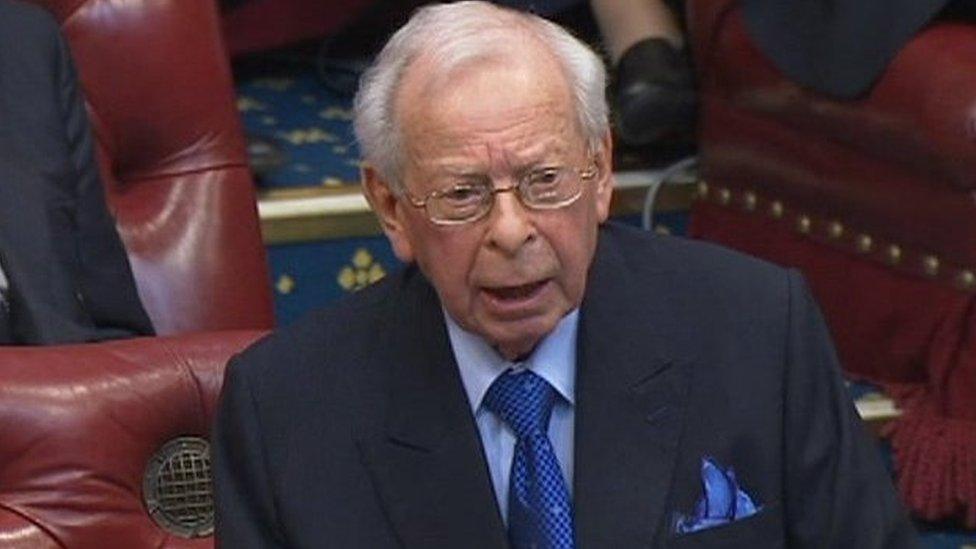Welsh election: Public spending and the Barnett formula
- Published

The late Lord Barnett said the formula which bore his name was no longer fit for purpose
Less government money is spent for each person in Wales than in Scotland or Northern Ireland. Why is that? And what is the mysterious Barnett formula which is often blamed?
Block grant
Most of the money spent by the Welsh Government is funded from the so-called block grant which it gets from the UK Treasury. In addition, the UK government spends money directly across the country, for example on the state pension and other benefits.
The original reason that Wales gets less goes back to the 19th Century when the then Chancellor of the Exchequer, George Goschen, set out rules for extra spending in Scotland and Ireland. Wales was included with England, so it didn't get the same bonus.
That system developed into the block grants we still have today. They used to be re-negotiated every year until someone had the bright idea of coming up with a mathematical formula for deciding how much the grant should rise or fall each year.
Barnett formula
Joel Barnett was a Labour cabinet minister in the 1970s. It was Barnett who developed the new rules, so the formula was named after him.
The aim of the formula is to maintain the relative spending levels in different parts of the country. So if the UK government decides to spend an extra £1,000 per person on something that only covers England, the Barnett formula should mean that the block grant to Wales also goes up by £1,000 per person.
To calculate how much the block grant needs to go up in total, the formula looks at the size of the Welsh population relative to the size of the population of England. At the moment it's about 5.7%. So for every pound of extra spending in England, Wales gets just under 6 pence.
The formula also applies to spending cuts in the same way.
Devolved or not devolved?
It's not quite that simple, though. Not all areas of government policy are devolved. And some are more devolved than others.
So the formula also includes another factor: the "comparability percentage" for each area of spending.

The idea here is that the amount of extra funding that goes to Wales and the other nations should depend on the extent to which the particular area of spending is devolved.
So for fully devolved areas like education, extra spending in England is matched fully, on a per-person basis, in Wales. Health is also considered to be almost completely devolved. But for spending on culture, media, and sport the estimate is about 77%.
In other words, for every extra pound per person of spending on sport announced by the UK government, the Welsh Government gets an extra 77 pence per person.
Is the Barnett formula to blame for Wales getting less?
The critical thing to remember is that the Barnett formula only governs the annual change to the block grant. It's not responsible for the original disparity in levels of spending across different parts of the UK.
It does help to maintain the existing gaps in cash terms. But over time that should actually mean that the disparities between the nations become less significant.
In later life Lord Barnett, who was made a member of the House of Lords in 1983 and died in 2014, said that the formula was "grossly unfair" and should be abolished.
In 2015 the UK government introduced a funding floor for Wales, promising that public spending per head should not fall below 115% of the figure for England.
That should ensure that the additional money it receives compared to England is maintained, but it probably won't do anything to help Wales catch up with Scotland or Northern Ireland.
- Published25 November 2015

- Published6 April 2016
